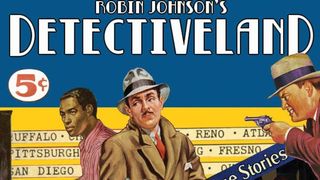
This article was originally published in PC Gamer issue 299. For more quality articles about all things PC gaming, you can subscribe now in the UK and the US.
Interactive fiction games are the more literary cousins of choose-your-own-adventure books and old-school text adventures. They’re the modern incarnation of an old artform. They’re also far easier to make yourself than creating games in Unity or GameMaker—all they require is a PC and the ability to read and write. Those requirements are all you need to play one of these games, too. That and a couple of hours to kill, and a willingness to do a lot of clicking.
That low barrier to entry means just about anyone can make an IF game, and that leads to some delightfully weird works of art from people whose creative streaks aren’t held back by what they can and can’t do in code.
Jason McIntosh is the lead organiser of the Interactive Fiction Competition, which has been going since 1995, making it older than some of the people competing. He took over the competition in 2014 from his predecessor Stephen Granade, who had been in the role for 13 years, and he’s incredibly proud of what the competition has become. It started off as a way to recapture the pleasure of playing an old-fashioned type of game, and evolved into something entirely its own.
IF, McIntosh says, is uniquely accessible. "It's a way to tell a story as a game, or present challenging narrative puzzles... and there are some things that can only be done, or done in a certain way, using text.”

It’s because of IF’s popularity as an artform that the Interactive Fiction Competition had a record number of submissions in 2016—58 in total. These range from the short and the poetic to longer, more ambitious pieces, and judging was open to anyone who has the time to play a few games. One of the most fascinating things about the competition is the huge diversity and range of experimentation in the entries. There are personal tales, boisterous quests, traditional text adventures and stories that have no satisfying end.
“It’s really grown to encompass a whole swathe of styles and platforms,” McIntosh says. “I really love seeing a ‘dead’ form like text games continue to ripple with life in surprising new ways.”
PC Gamer Newsletter
Sign up to get the best content of the week, and great gaming deals, as picked by the editors.
I really love seeing a ‘dead’ form like text games continue to ripple with life in surprising new ways.
Jason McIntosh
It’s this wish to replay and re-invent our childhood games that’s buoying much of indie game development at the moment, with the resurgence of pixel and ow-poly games, and events like the GBJAM, in which all games are inspired and limited by what the Game Boy can do. Nostalgia has become an incredibly lucrative, marketable thing, and though that might lead to the death of creativity and originality in some genres, it means the revival and survival of others.
Interactive fiction, importantly, is free. Many games—such as Zoe Quinn’s Depression Quest—invite players to donate if they wish, but there are no requirements to do so if you want to play. Its freeness is also freedom—without feeling like they owe the player something for their money, developers are able to be weirder, more unexpected, more experimental. It’s this weirdness and freedom that makes the entries in the IFComp so thrilling to flick through.
One game, 500 Apocalypses, has you walk through a museum—which, on-screen, means scrolling through rows and rows of variously-sized dots, where each dot represents one apocalypse. Blue ones are unvisited, red are ones you’ve read. Sometimes, they link to one another—one man’s musing on God at the end of his world might lead to another, godless planet in which giant, sentient beetles line up to mate with the Queen. It’s an incredibly interesting and foreign experience as you flit through the archives of ended worlds, each unfamiliar but united by terror, sadness and loss.

And then, there are games like SCREW YOU, BEAR DAD. The title implies silliness, jokes, light-hearted humour—and the game delivers on all that, but also weaves in a story of difficult father-son relationships in a way that’s unexpected and touching. It’s also incredibly well-written and very funny.
Some games have objectives, such as 16 Ways to Kill a Vampire at McDonalds, which is exactly what it sounds like, and Evermore, which is a sort of you-will-definitely-die-a-lot exploration of Edgar Allan Poe’s poetry. Find the answer, get to the end, kill the vampire at McDonald’s—these are all traditional videogame win states, and that’s one way to write interactive fiction.
But other games just want to take you on a journey, and tell you their story, and that’s something you don’t get a lot in videogames. There’s agency in your choices, or at least in the raw fact that you get to choose—but the story exists without you, and you are not the hero. IF has the power to show you these little vignettes, and let you decide what they mean, and what they mean to you.
McIntosh sees interactive fiction as a powerful storytelling tool because of its approach to narrative. “Interactive fiction is a creator building a delicate, wholly automated story machine and inviting people to come through it. In some ways, it’s closer to the relationship between any author of fiction and her audience.” It’s a conversation between two strangers—an invitation to read, and to learn, and to choose.
Most Popular


